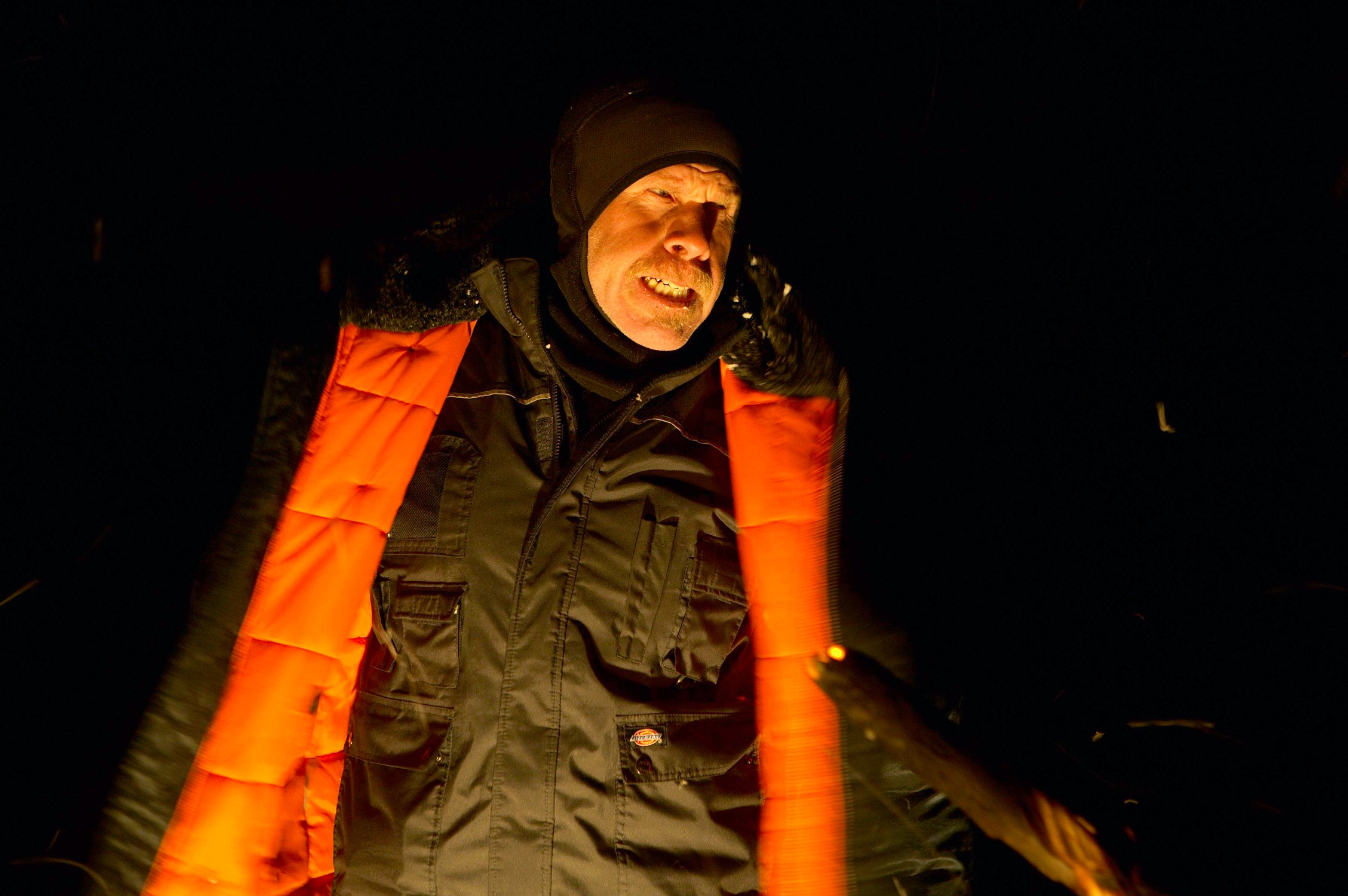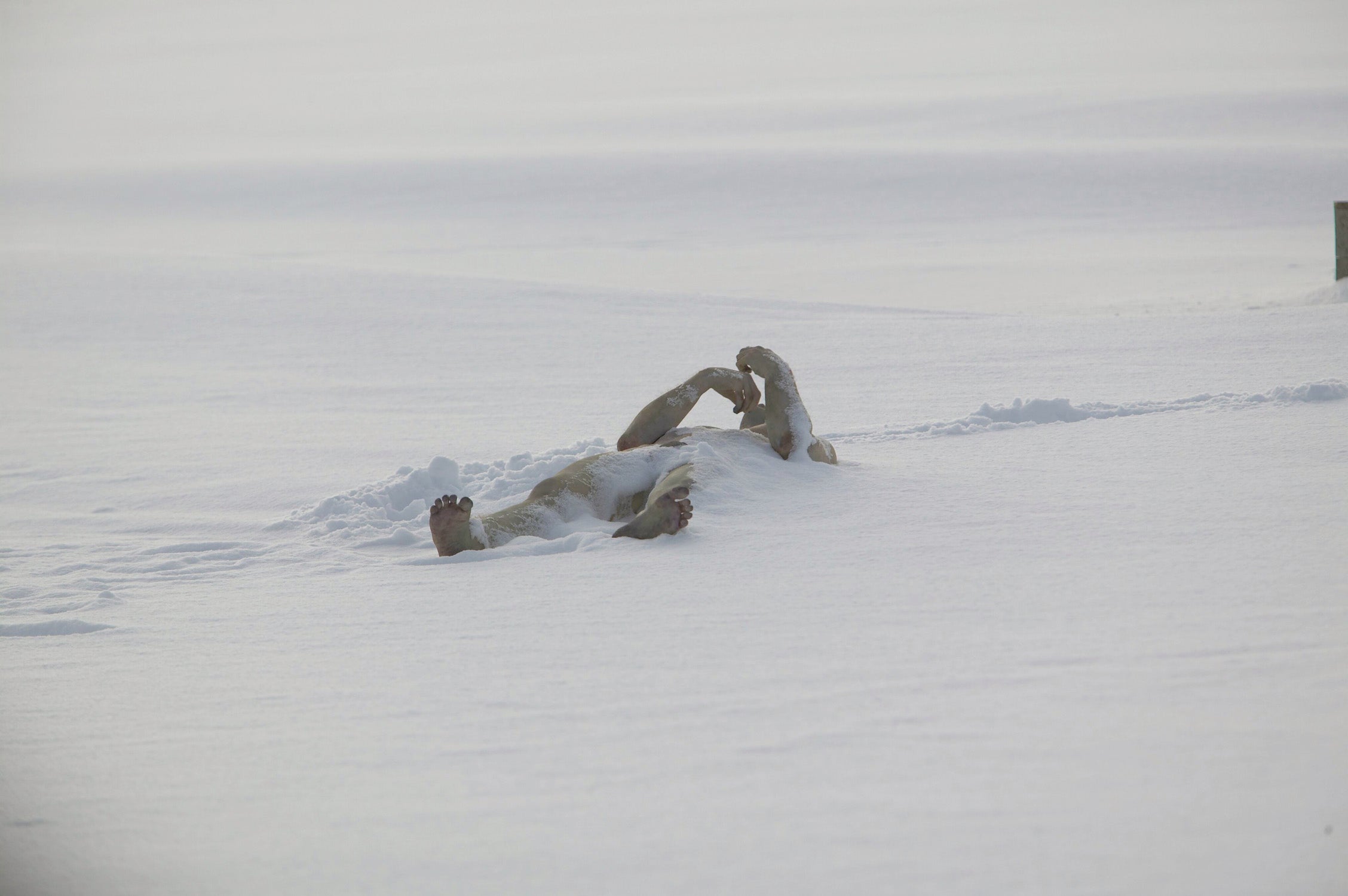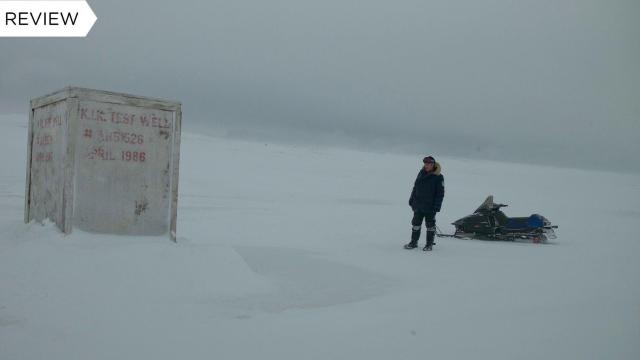Thanks to the growing abundance of weird and dangerous weather, it’s getting harder to ignore the bleak reality of climate change — though that doesn’t stop many people, especially people in power, from blithely denying its existence. Released in 2006, Larry Fessenden’s The Last Winter asked a question that’s even more pressing today: What if the Earth, drained and damaged from generations of careless humans, started punching back?
In a part of Alaska so remote it feels like the edge of the world, a small team working for an oil-drilling company that’s just gotten congressional approval to tap into a well situated within a wildlife refuge (red flag!) has two big problems. First, the temperature is so oddly warm they’re unable to construct the ice roads they’ll need to bring their heavy equipment in. And second, the on-site environmental experts, a required component of their government deal, refuse to sign off on any other transport methods, despite toxically macho crew chief Ed Pollock’s (the great Ron Perlman, who is perfect in this role) way of “ordering” instead of “asking.”
Those roadblocks pile on top of the expected hazards that go with this type of work (boredom, loneliness, cabin fever), but there’s another issue that’s starting to creep its way into the camp: The land itself is having a decidedly negative reaction to their presence. The first to pick up on it is lead environmentalist Jim Hoffman (James LeGros), who’s as concerned with the rising temperatures as as he is with this variable he can’t chart. “Something up here is off,” he muses. “It’s in the numbers… but I can also feel it.” He has a hard time convincing the others, especially the blustery Ed — whose general attitude is “fuck this hippie bullshit, we got a job to do” — but as The Last Winter progresses the signs become exceedingly difficult to ignore.

The tension that builds throughout The Last Winter feels very familiar to the realm of snowbound survival horror. Think The Thing, The Shining, or basically any movie where an isolated group of people are set upon by a supernatural force that causes paranoia, distrust, and other behaviour changes, on top of other external horrors. (In this case, well, a lot of eyes get pecked out by aggressive ravens, and that’s merely one example.) And there’s been no shortage of “environmental revenge” films — from thoughtfully existential forest nightmares like Ben Wheatley’s recent In the Earth to more hysterically schlocky examples, like the subject of another recent Retro Review: pollution-spawned mutant-bear saga Prophecy.
The Last Winter’s blend of these two genres is effective throughout, with its oil-drilling themes (bolstered by actual footage of oil-well fires and mentions of real-life disasters like the Exxon Valdez spill) giving extra weight to its central conflict. Though we’re meant to sympathise with the humans, it’s obvious that they’re also the antagonists, the invaders, and the aggressors of this story. Fessenden — an indie cult and horror luminary who co-wrote the script with Robert Leaver, and who has a brief on-screen role as Ed’s crass boss — works The Last Winter’s vengeful menace into its technical elements, giving us shots that fell like they’re from the POV of the howling wind as it swirls above and around the compound, even at one point dipping down and circling the buildings as if peeking at the people behind the windows.
The bad vibes come in small waves, but soon begin engulfing everything and everyone. Maxwell (Midnight Mass’ Zach Gilford), the youngest member of the crew, is the first to start behaving oddly, something everyone chalks up to his inexperience — especially Ed, who’d encouraged the kid’s father to toughen him up by sending him to the Arctic. Jim’s assistant, Elliot (Jamie Harrold), gets a nosebleed during an impromptu football match early in the film, and it never stops bleeding. There are random bursts of bizarre sudden storms, and the persistent sound of strange, disembodied hoofbeats that nobody wants to acknowledge. The crew’s two indigenous members, Lee and Dawn (Pato Hoffman and Joanne Shenandoah), wonder if maybe it’s all an omen that a mythological dark spirit like a Chenoo or a Wendigo is soon to arrive (as a side note, Fessenden had previously made a movie called Wendigo in 2001, so it’s clearly a topic of fascination for him).

Though Jim’s passion for completing this particular assignment begins to waver — at a certain point, he admits he’s tired of trying to convince people like Ed of scientific fact, and you’re just glad he’s living in a time before social media’s tsunami of disinformation took over — his investment in the mystery only grows more urgent. He wonders, both in conversations and in his private journal, if it’s “an atmospheric anomaly affecting everyone’s judgment.” Or maybe sour gas seeping from the melting permafrost, or some kind of virus, spores, or other contagion emerging from earth that’s been frozen for 10,000 years? Or maybe “something beyond science”? Like, say, that “the very thing we’re here to pull out of the ground” is “rising willingly to confront us”? He refuses to see what’s happening as revenge, because nature doesn’t work that way — but it’s hard for us not to think so.
The Last Winter isn’t subtle pushing its apocalyptic themes, and by the time it enters its final act it’s become a full-on horror movie, pushing aside icy suspense and back-of-the-neck prickles in favour of a rising body count. It may at times come across a bit heavy-handed, but its message is still a timely and valuable one, showing a microcosm driven to total collapse by a planet that’s ready to kick humans out of the ecosystem for good. Really, can you blame it?
The Last Winter, which also stars American Horror Story’s Connie Britton and ubiquitous indie actor Kevin Corrigan (The King of Long Island), is now streaming on Shudder.
